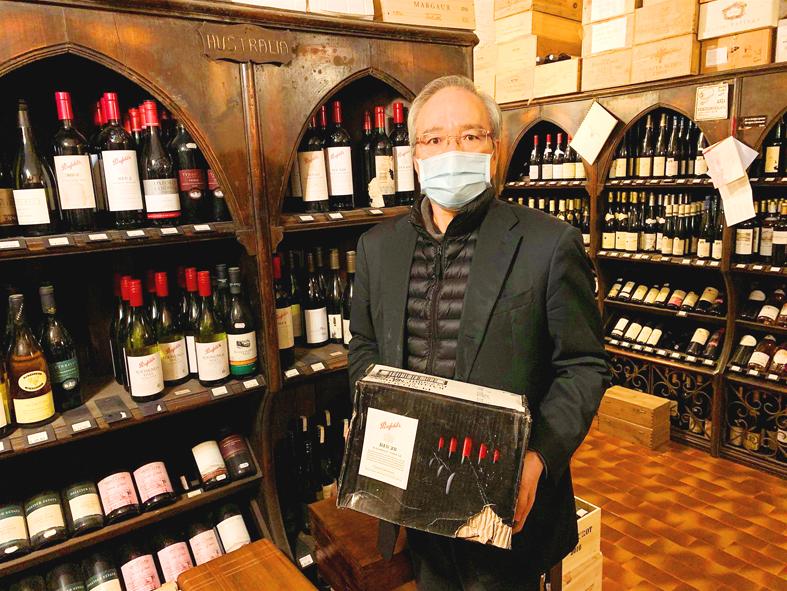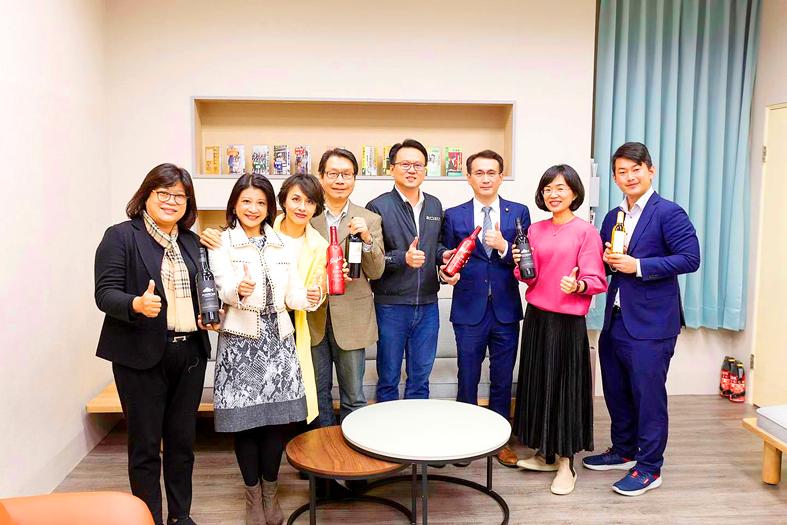Taiwan would take action to back Australians at a time when they are “under tremendous pressure,” President Tsai Ing-wen (蔡英文) said yesterday, as tensions between Australia and China heated up.
Taipei and Canberra have been mutually supportive in fighting the COVID-19 pandemic, especially in exchanging critical medical materials in the early stages, Tsai said, before chairing the Democratic Progressive Party (DPP) Central Standing Committee meeting in Taipei.
Taiwan and Australia are like-minded nations, sharing the common values of democracy, freedom and human rights, while their economic and trade relations have also become close, she said.

Photo: screen grab from Facebook
Canberra has been voicing support for Taiwan’s international participation, and Taiwanese are empathetic and supportive of Australians at a time when they are under tremendous pressure, Tsai said.
The government would deliberate the best means to let Australians feel the friendship of Taiwanese, she said.
Canberra-Beijing ties have soured after a series of trade and diplomatic disputes.

Photo: screen grab from Facebook
Beijing on Saturday last week started imposing import tariffs of up to 212 percent on Australian wine, accusing Australia of dumping its wine on the Chinese market.
Canberra said that it was “extremely disappointed” by the decision.
Chinese Ministry of Foreign Affairs spokesman Zhao Lijian (趙立堅) on Monday posted on Twitter a doctored photograph showing a grinning Australian soldier holding a bloody knife to the throat of an Afghan child holding a lamb. The caption read: “Shocked by murder of Afghan civilians & prisoners by Australian soldiers.”
Australian Prime Minister Scott Morrison demanded that China remove the photograph and apologize for the “repugnant post,” but was rejected by Beijing.
Over the past few days, many government agencies and Internet users have shown their support for Australia by sharing photographs of Australian wine on social media.
“Australian wine will be featured at a White House holiday reception this week. Pity vino lovers in China who, due to Beijing’s coercive tariffs on Aussie vintners, will miss out. #AussieAussieAussieOiOiOi!” the US National Security Council wrote on Twitter on Tuesday.
The Ministry of Foreign Affairs yesterday posted on Twitter a photograph of two bottles of wine, with a caption that read: “We stand in solidarity with #Australia by serving #FreedomWine at @MOFA_Taiwan.”
The Australian Office in Taipei is to mark its 40th anniversary next year, showing that the bilateral friendship is steadfast and enduring, ministry spokeswoman Joanne Ou (歐江安) said in a statement.
Taiwan and Australia stand stronger together, and would continue to deepen their partnership to defend their shared values and maintain regional stability, she said.
Meanwhile, lawmakers joined their counterparts from around the world in calling on their constituents to drink Australian wine this month as part of a campaign to rebuff China’s tariffs.
The Inter-Parliamentary Alliance on China, a group of more than 200 lawmakers from 19 nations, on Tuesday released a video urging people to “join us in standing against [Chinese President] Xi Jinping’s (習近平) authoritarian bullying” by buying Australian wine.
Democratic Progressive Party (DPP) Legislator Chiu Yi-ying (邱議瑩), chairwoman of the Taiwan-Australia Inter-Parliamentary Amity Association, yesterday posted a video on Facebook featuring a number of lawmakers extolling their support for Australian “freedom wine.”
DPP Legislator Lo Chih-cheng (羅致政) said that Australia is experiencing the worst of China’s bullying, similar to Taiwan.
As to whether any Taiwanese lawmakers would join the alliance, Lo said that some have applied, but their applications are under review.
Independent Legislator Freddy Lim (林昶佐) said that he believes some would join when the time is right.
Ambassador to the Holy See Matthew Lee (李世明) also joined in the campaign on Tuesday by buying a box of Australian wine.
Lee on the embassy’s Facebook page posted a photograph of himself holding the box of wine, along with the message: “Fraternity is not a trend or a fashion ... but the result of concrete acts,” echoing Cardinal Pietro Parolin’s presentation of Pope Francis’ October encyclical Fratelli Tutti.

Conflict with Taiwan could leave China with “massive economic disruption, catastrophic military losses, significant social unrest, and devastating sanctions,” a US think tank said in a report released on Monday. The German Marshall Fund released a report titled If China Attacks Taiwan: The Consequences for China of “Minor Conflict” and “Major War” Scenarios. The report details the “massive” economic, military, social and international costs to China in the event of a minor conflict or major war with Taiwan, estimating that the Chinese People’s Liberation Army (PLA) could sustain losses of more than half of its active-duty ground forces, including 100,000 troops. Understanding Chinese

The Ministry of Foreign Affairs (MOFA) yesterday said it is closely monitoring developments in Venezuela, and would continue to cooperate with democratic allies and work together for regional and global security, stability, and prosperity. The remarks came after the US on Saturday launched a series of airstrikes in Venezuela and kidnapped Venezuelan President Nicolas Maduro, who was later flown to New York along with his wife. The pair face US charges related to drug trafficking and alleged cooperation with gangs designated as terrorist organizations. Maduro has denied the allegations. The ministry said that it is closely monitoring the political and economic situation

UNRELENTING: China attempted cyberattacks on Taiwan’s critical infrastructure 2.63 million times per day last year, up from 1.23 million in 2023, the NSB said China’s cyberarmy has long engaged in cyberattacks against Taiwan’s critical infrastructure, employing diverse and evolving tactics, the National Security Bureau (NSB) said yesterday, adding that cyberattacks on critical energy infrastructure last year increased 10-fold compared with the previous year. The NSB yesterday released a report titled Analysis on China’s Cyber Threats to Taiwan’s Critical Infrastructure in 2025, outlining the number of cyberattacks, major tactics and hacker groups. Taiwan’s national intelligence community identified a large number of cybersecurity incidents last year, the bureau said in a statement. China’s cyberarmy last year launched an average of 2.63 million intrusion attempts per day targeting Taiwan’s critical

‘SLICING METHOD’: In the event of a blockade, the China Coast Guard would intercept Taiwanese ships while its navy would seek to deter foreign intervention China’s military drills around Taiwan this week signaled potential strategies to cut the nation off from energy supplies and foreign military assistance, a US think tank report said. The Chinese People’s Liberation Army (PLA) conducted what it called “Justice Mission 2025” exercises from Monday to Tuesday in five maritime zones and airspace around Taiwan, calling them a warning to “Taiwanese independence” forces. In a report released on Wednesday, the Institute for the Study of War said the exercises effectively simulated blocking shipping routes to major port cities, including Kaohsiung, Keelung and Hualien. Taiwan would be highly vulnerable under such a blockade, because it